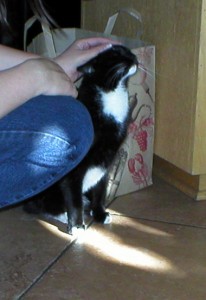We’re all feeling a bit sleepy today:

We’re all feeling a bit sleepy today:

![]()
![]()
![]()
![]()
![]()
![]()
japīca
a feeling that occurs when thinking of something wanted not having happened, disappointment. So, let’s say (again) you and your friends or family are thinking of going to the market, and you really want to go (’cause you hope to see someone there or something). Then the trip is canceled for whatever reason. One could say:
sele japīca to wā ñi lēim rātāsa;
I’m disappointed we’re not going to the market.
![]()
![]()
![]()
![]()
![]()
![]()
jaþēra
a feeling that occurs when thinking of something unwanted not having happened, relief. So, let’s say you and your friends or family are thinking of going to the market, and you don’t particularly want to go (’cause you don’t have any money maybe or some other reason). Then the trip is canceled for whatever reason. One could say:
sele jaþēra to wā ñi lēim rātāsa;
I’m relieved we’re not going to the market.
![]()
![]()
![]()
![]()
![]()
![]()
jawāna
the feeling that things are not as they should be, that something is wrong.
![]()
![]()
![]()
![]()
![]()
![]()
jaxālāe
the feeling that things are as they should be. Unlike anþīrne, this does not presume that things are good.
![]()
![]()
![]()
![]()
![]()
![]()
![]()
![]()
![]()
antalōren
a feeling of sadness that persists for a period of time. Unlike ancēxīwe this is not necessarily because someone feels things are bad, were bad, and will be bad in the future. Nor is this the same thing as grief.
![]()
![]()
![]()
![]()
![]()
![]()
![]()
![]()
ancēxīwe
ancēxīwe is the opposite of anþīrne, so the feeling that things are bad for a person, have been bad, and will be bad in the future – so despair, resignedness. Again, this is used as a stative noun in a PA clause, and can also refer to a pessimistic outlook.
![]()
![]()
![]()
![]()
![]()
![]()
![]()
anþīrne
the feeling that things are good for a person, have been good, and will be good in the future – so contentment, peace. Generally this is used as a stative noun in a PA clause, so pa anþīrne liēn “Contentment has me.”/”I am content.” anþīrne can also refer to an optimistic outlook, so la liēn maþīrne is “I am a contented person.”/”I am generally optimistic.”
With Sophie, my sister’s cat…

getting scritched.

settling in for a nap.
![]()
![]()
![]()
![]()
![]()
![]()
jalōra
a feeling of sadness, defined as “something bad is happening or has happened in the recent past; thinking about this, I feel something bad.”
![]()
![]()
![]()
![]()
![]()
![]()
anlōra
Like anānte, when modifying a person, anlōra means that the person seems to be feeling sadness, and when modifying an object or event, it means that the object or event is inducing or can induce sadness in a person. anlōra can also be used in the clause-level modifier phrase ānen anlōra which means “sadly” or “with sadness”.